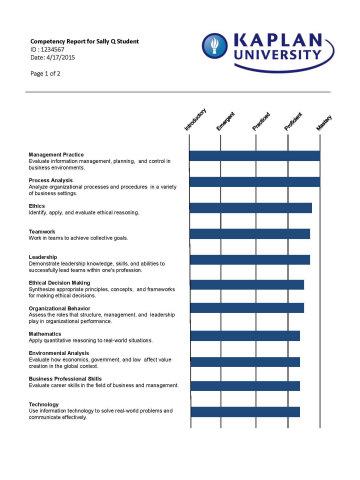DAVENPORT, Iowa--(BUSINESS WIRE)--As part of its ongoing commitment to measuring student learning, Kaplan University today announced that it has started providing its students with a personalized Competency Report. The report provides assessments of a student’s skill and knowledge demonstrated throughout his or her program(s) of study at the University. It includes how the student applies the knowledge, skills, abilities, and behaviors required to execute work-related activities and projects. Kaplan University students will have competency reports available to them by July 1, 2015.
Kaplan University’s Competency Report contains a list of professional and programmatic competencies denoting one of six levels of proficiencies achieved--No Progress, Introductory, Emergent, Practiced, Proficient, Mastery. Kaplan University is one of the first institutions in higher education to issue such a report for each of its students at this granular level and on this scale. Today, approximately 42,000 students attend Kaplan University.
“The detailed reports we are now providing to all of our students are a very powerful complement to a traditional college transcript. Our reports highlight work-relevant competencies a student demonstrates throughout his or her studies at Kaplan University. Combining an official graded transcript and the Competency Report provides a more complete picture of a student’s academic achievement,” said Kaplan University Provost Dr. Betty Vandenbosch.
The Competency Report, visible to each student through the student portal at any time during his or her program, is available as a printable PDF. Students can tailor the printed report for the intended recipient by choosing which competencies to share.
“The Competency Report is incredibly valuable to not only our students to augment their resumes but to employers looking for employees who are job ready on day one. Increasingly, employers are placing more emphasis on what students and graduates can do rather than simply what they may know,” added Jennifer Lasater, Kaplan University’s Vice President of Employer and Career Services.
Lasater noted that finding talent with the right skills is a big challenge for many employers. According to ManpowerGroup’s 9th annual Talent Shortage survey (2014), 40 percent of US employers surveyed reported difficulty filling jobs. The top two reasons employers are having difficulty, according to employers surveyed, are the lack of both technical competencies (hard skills) and workplace competencies (soft skills) at 47% and 39% respectively (1).
Bridging the Gap with a Evidence-Based Reality Check
Additional recent surveys show significant disparities—and, in some instances, canyon-sized gaps between college leaders, students and employers on whether college graduates are prepared for the job market.
- A 2013 survey of nearly 400 presidents and chancellors at four-year colleges revealed that nearly 3 in 4 college leaders (73%) said their students were very well or well prepared, compared to 1 in 5 (20%) employers (2).
- Another 2013 survey showed significant gaps between students’ estimation of their own workforce readiness the estimation of hiring managers (3).
- Ninety-six percent of chief academic officers surveyed by Inside Higher Ed in 2014 said they were doing a good job preparing students for success in the work force (4).
- In a 2014 survey conducted by Gallup measuring how business leaders and the American public view the state and value of higher education, just 14 percent of Americans – and only 11 percent of business leaders – strongly agreed that graduates have the necessary skills and competencies to succeed in the workplace (5).
“A Competency Report helps bridge the skills gap by providing us all with a much needed evidence-based, skill specific confirmation,” said Vandenbosch.
Today’s announcement by Kaplan University is another important step in a journey that has taken over a decade to create its comprehensive competency-based education model. General education competencies have been incorporated across the curriculum, not just in general education courses, since 2009 and the University began measuring course-level outcomes through assessments that identify students’ current mastery level of skills and knowledge in 2010. The University has also deployed randomized controlled trials to measure and improve the efficacy of outcome based assessments. Last month, Kaplan University announced that its entire curriculum (undergraduate and graduate) now includes professional competencies— communication, teamwork, leadership, problem solving and critical thinking, personal presentation, multiculturalism and diversity.
Sources:
1. Ninth annual Talent Shortage Survey (2014), ManpowerGroup.
2. What Presidents Think: A 2013 Survey of Four Year College Presidents, Maguire Associates and The Chronicle of Higher Education.
3. Bridge That Gap: Analyzing the Student Skill Index, Harris Interactive on behalf of Chegg Inc., 2013.
4., 5. Grasgreen, Allie. “Ready or Not.” Inside Higher Ed, 26 February 2014.
About Kaplan University
Kaplan University offers a different school of thought for higher education. It strives to help adult students unlock their talent by providing a practical, student-centered education that prepares them for careers in some of the fastest-growing industries. The University, which has its main campus in Davenport, Iowa, and its headquarters in Chicago, is accredited by The Higher Learning Commission www.hlcommission.org. Kaplan University serves approximately 42,000 online and campus-based students. The University has 13 campuses in Iowa, Indiana, Nebraska, Maryland, Maine, and Wisconsin, and Kaplan University Learning Centers in Maryland and Missouri.
Kaplan University is part of Kaplan Higher Education LLC and Kaplan, Inc., which serves over 1.2 million students globally each year through its array of higher education, test preparation, professional education, English-language training, university preparation, and K-12 offerings to individuals, institutions, and businesses. Kaplan has operations in over 30 countries, employs more than 22,000 full- and part-time professionals, and maintains relationships and partnerships with more than 1,000 school districts, colleges, and universities, and over 2,600 corporations and businesses. Kaplan is a subsidiary of Graham Holdings Company (NYSE: GHC) and its largest division. For more information, please visit www.Kaplan.com.





